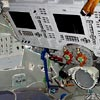Potential impact of the study:
-
Stem
(primitive) cell research as replacement therapy for diseased and damaged body
cells holds the key to the cure or alleviation of conditions like spinal cord
and brain damage, diabetes, genetic diseases, cancer, damaged heart cells and
many others. Stem cells, as the most primitive and undifferentiated of all
the body cells, have the ability, under certain conditions, to develop to any
other body cell. Stem cells can therefore play a major role in
preventative and curative health programs for future generations, because they
can replace damaged body cells. Finding optimal conditions for the culture and
development of stem cells will therefore become increasingly more important.
If zero gravity proofs to be beneficial to the development of stem cells,
micro-gravity conditions for stem cell growth and differentiation can be
established. This can also put South Africa on the forefront of stem cell
research in the world today.
-
The ESCD
project also deal with the development of animal embryos from a very early stage
until after hatching of the embryo from its zona pellucida (surrounding capsule)
in vitro (in an incubator). As space programs progress, we might get to
the point where human fertilization takes place under zero gravity conditions,
or after conception on earth, early embryonic development will take place in
space. This project will give us a very good insight in early embryonic
development under conditions of zero gravity. Will it speed up or slow
down development? Will it be detrimental to cell growth? Will it
supply answers to the large offspring syndrome (LOS) found in cloned animals,
where the embryo is also cultured for seven days before transfer to a surrogate
that will carry it to term?
-
We see the
opportunity of the space research project as the ideal opportunity to conduct
experiments that might give us answers to embryonic developmental problems in
animals and man. Can zero gravity conditions possibly be the answer for
embryonic (during development in the uterus) and congenital (at birth)
aberrations found in mammals? The development of the embryo and fetus
under conditions of zero gravity (compared to lowered gravity in the uterus)
might give us answers to fetal developmental problems that influence so many
newborn children and families in South Africa. By following embryonic and
fetal development under conditions of micro/zero gravity, we might be able to
explain why certain congenital abnormalities develop during the growth of the
fetus in the uterus.
-
It might
also play a role in the existence of endangered species. If somatic (body)
and stem (undifferentiated) cells grow better under zero gravity conditions,
scarce and valuable body cells from endangered wildlife species can be grown in
a culture medium, stored and cloned under micro-gravity conditions in future to
ensure the survival of many endangered species in our country. This can
play a crucial role in the eco-tourism industry of South Africa.
-
The project
will be crucial for student training. Conditions of total weightless are
impossible to create on earth. The space program is an unprecedented
opportunity to do valuable research under zero gravity condition in a field of
extreme importance for the future of the human race on earth. Regenerative
tissue and genetically changed organ transplants will play a big role in future
health treatments. This experiment might supply conditions and solutions
to improve our understanding and techniques of stem cell development in the
laboratory, information of major importance for further study of our post
graduate students.
-
Scientific
data of an international standard will be generated from this experiment.
It will be published in a scientific journal of repute. It will also place the
University of Stellenbosch amongst the leaders in stem cell research in the
world today.
|
|






